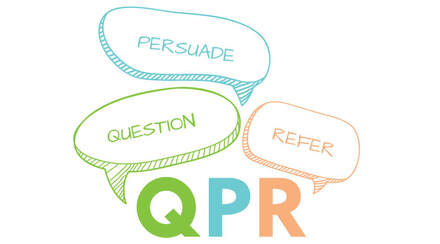QPR (Question, Persuade, Refer) Gatekeeper Training is a 1-2 hour suicide prevention training to teach "gatekeepers" the warning signs of a suicide crisis and how to respond. Trainings can be tailored for various frontline professionals including law enforcement, medical professionals, school staff, first responders, and more.
|
What is a Gatekeeper?
Gatekeepers can be anyone, but include parents, friends, neighbors, teachers, first responders, and many others who are strategically positioned to recognize and refer someone at risk of suicide. The QPR Institute believes that "at least one person per family unit should be trained in QPR". As a QPR-trained Gatekeeper, you will be able to...
|
Program Objectives
- Recognize someone at risk for suicide
- Intervene with those at risk
- Refer them to an appropriate resource
Please contact Prevention Plus for more information or to schedule a training.

